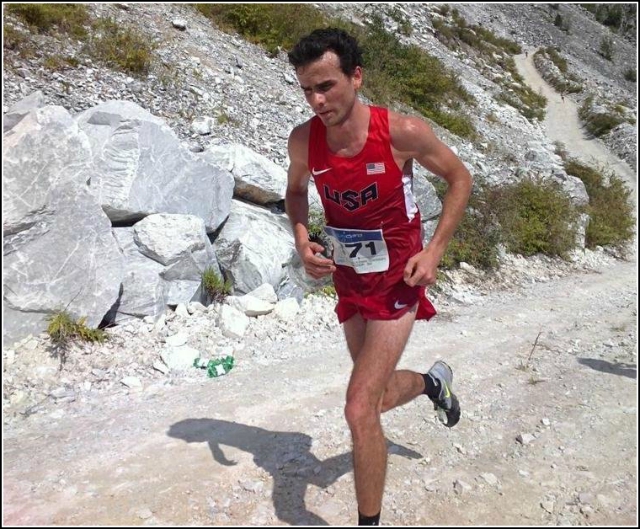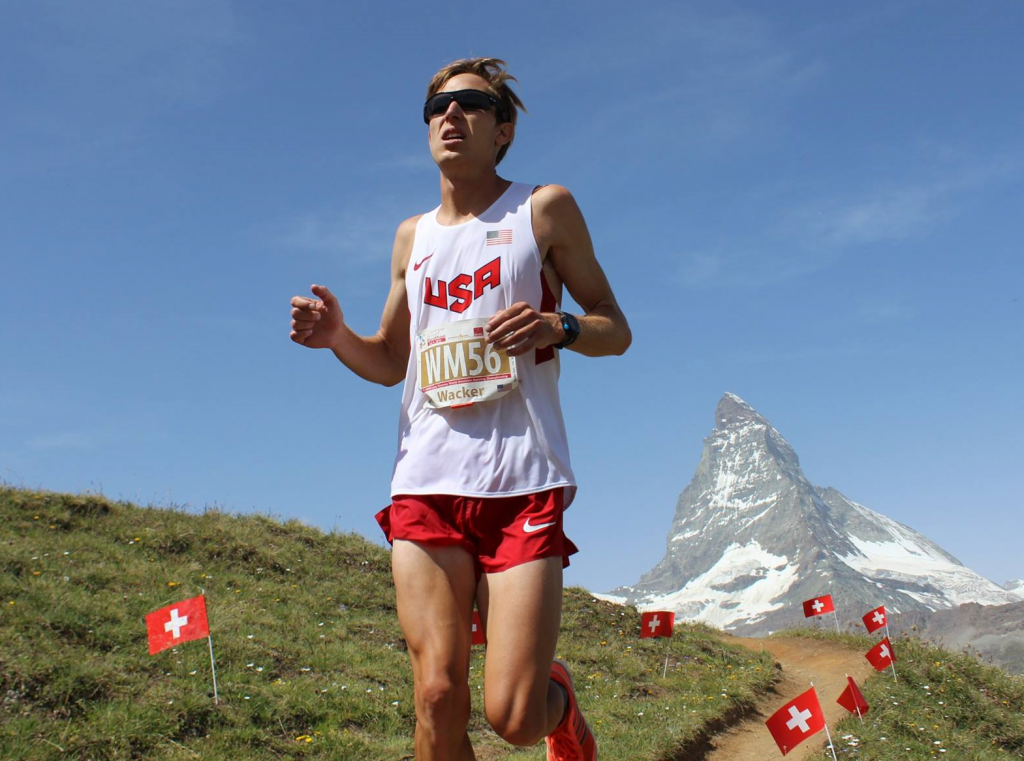Moving to Colorado has allowed me to run the most gorgeous trails in the Front Range:
A photo posted by Jason Fitzgerald (@jasonfitz1) on
But don’t let their beauty fool you. The technical trails, unforgiving terrain, and lung-searing thin air make you realize just how difficult it is to run in the mountains.
What’s easy on the roads becomes a race effort in the mountains. I’m usually 1-2 minutes slower per mile when I run there!
So you can imagine how impressed I am with runners who excel at challenging mountain races.
How do they do it (and make it look easy)?
What’s their training like?
And what advice do these superhumans have for us regular runners?
I’m excited to bring you two exclusive interviews with the top two male finishers at the 2015 US Mountain Running Championships: Patrick Smyth and Andy Wacker.
Patrick Smyth on Mountain Running: Go For It!

Photo by Richard Bolt
Patrick Smyth has an impressive running resume off the mountains. A seven-time All-American at the University of Notre Dame, he’s run under 14:00 for the 5k and under 28:30 for the 10k.
A Nike Trail Team sponsored athlete, he’s now the US Mountain Running Champion, running a blistering 46:10 at the recent 12k race held in Bend, Oregon. The course was three loops of 4km featuring a big uphill and downhill on each loop.
Patrick was kind enough to share his background, experience, and advice with the Strength Running community.
Jason: Patrick, let’s start with your background. How did you get into mountain running and what was the transition like from traditional races to mountain races?
Patrick: In college (Notre Dame) and post-collegiately I focused my racing on the track, cross country, and roads. But growing up in Salt Lake City, I had always run some mileage on the trails.
So when I found myself back in Salt Lake City, Utah for grad school in 2012 and burned out on the track and roads, I started playing on the trails again and really enjoying it.
Then of course, I started racing trails and mountain races. I’d say the transition was pretty seamless as I’d always enjoyed that kind of running.
Trail running is definitely a lot more fun than slogging away on the roads! So, with your impressive personal bests on the road and track, have you found that this speed has helped your mountain running?
Yes. Having speed and efficiency carry over from the track has made me a more versatile trail runner.
I’m not a great climber or technical descender, but think I excel on everything in between because of my track and road background. The Mountain Running Champs in Bend was a good example of that.
Right. Though you have to be pretty good at climbing and descending to win the Championship! Ok so to get to a championship, what did your training look like before the race?
I typically had three hard session a week. Tuesday was a shorter track session, Thursday was hilly uptempo stuff or another track session, and Saturday was a long run usually on hills with some fartlek running.
My weekly mileage was about 80 miles per week on average with gym work twice a week (I do a lot of functional strength and kettle bell work).
When I need to spice things up in training, I’ll hop on my mountain bike.
Looks like well-rounded training to me. I love it. So let’s say someone reading this wants to get into mountain running. What advice do you have for that person?
Go for it! I think more than anything mountain running just takes a base-level of athleticism.
Even if you’re coming from a non-endurance background, mountain running is something a wide swath of the population can enjoy, more so even then your token road half marathon.
Can’t agree more. Running in the mountains is tough, but completely manageable. Let’s switch gears and talk about your recent win at the US Mountain Running Championships.
What was your race strategy like and did you have any specific pace goals going into the race?
My strategy was to hold my own on the climbs and try to get away on the downhills. Luckily, that was pretty much exactly how it unfolded.
I made a last second decision to not wear a Garmin or GPS watch, so I have no idea what my individual mile splits were. But in a mountain race, splits are irrelevant.
When you run in the mountains, you definitely run by effort. I really try to let the terrain dictate my pace in mountain races.
What’s next for you this year and where can we follow your progress?
My next race is the US 50k Trail Championships at the end of August and you can follow me on Twitter at @PatrickGSmyth.
Andy Wacker: “Fitness is Fitness”

Photo by Brett Nattrass
The runner-up spot was taken by Boulder, Colorado resident Andy Wacker. He trained under Coach Mark Wetmore while attending the Unversity of Colorado at Boulder and now represents Adidas, Feetures! Running, Skratch Labs and Team Colorado.
Andy was only 10 seconds behind Patrick at this year’s US Mountain Running Championships.
Listen to our interview by clicking the gray play button below. Or, you can listen from your browser here (right click and “save as” if you’d like to download the interview).
[audio:https://s3.amazonaws.com/StrengthRunning/Andy+Wacker+Mountain+Running+Interview.mp3]The best part of the interview is when Andy discusses his race strategy at 8:30 – it’s one of my favorite strategies, too!
Andy has several races scheduled over the next few months. You can follow him on Twitter for updates.
Please join me in thanking both Patrick and Andy for their time. It’s always illuminating to hear from the elites about training, racing, and their perspectives on running.